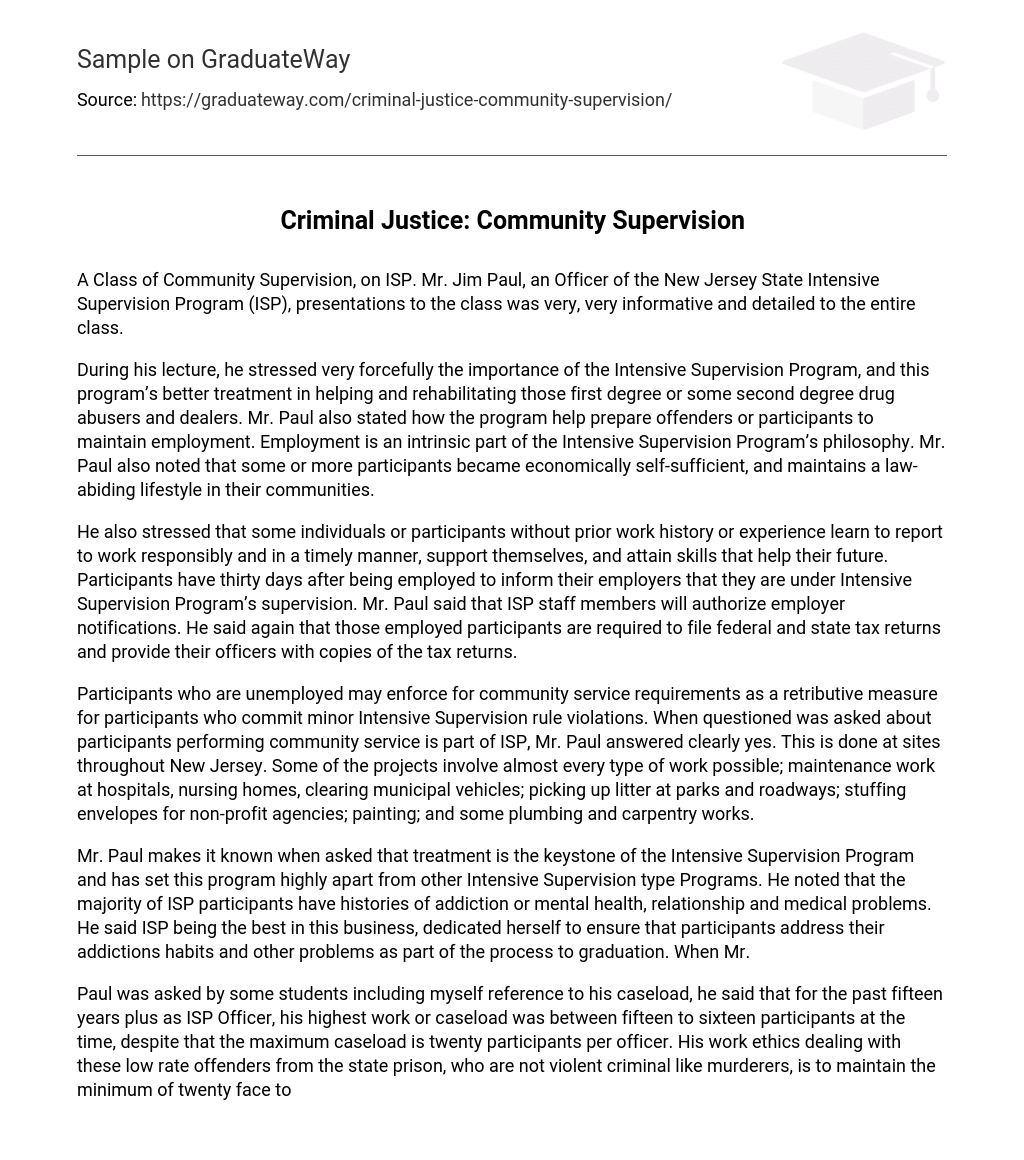A Class of Community Supervision, on ISP. Mr. Jim Paul, an Officer of the New Jersey State Intensive Supervision Program (ISP), presentations to the class was very, very informative and detailed to the entire class.
During his lecture, he stressed very forcefully the importance of the Intensive Supervision Program, and this program’s better treatment in helping and rehabilitating those first degree or some second degree drug abusers and dealers. Mr. Paul also stated how the program help prepare offenders or participants to maintain employment. Employment is an intrinsic part of the Intensive Supervision Program’s philosophy. Mr. Paul also noted that some or more participants became economically self-sufficient, and maintains a law-abiding lifestyle in their communities.
He also stressed that some individuals or participants without prior work history or experience learn to report to work responsibly and in a timely manner, support themselves, and attain skills that help their future. Participants have thirty days after being employed to inform their employers that they are under Intensive Supervision Program’s supervision. Mr. Paul said that ISP staff members will authorize employer notifications. He said again that those employed participants are required to file federal and state tax returns and provide their officers with copies of the tax returns.
Participants who are unemployed may enforce for community service requirements as a retributive measure for participants who commit minor Intensive Supervision rule violations. When questioned was asked about participants performing community service is part of ISP, Mr. Paul answered clearly yes. This is done at sites throughout New Jersey. Some of the projects involve almost every type of work possible; maintenance work at hospitals, nursing homes, clearing municipal vehicles; picking up litter at parks and roadways; stuffing envelopes for non-profit agencies; painting; and some plumbing and carpentry works.
Mr. Paul makes it known when asked that treatment is the keystone of the Intensive Supervision Program and has set this program highly apart from other Intensive Supervision type Programs. He noted that the majority of ISP participants have histories of addiction or mental health, relationship and medical problems. He said ISP being the best in this business, dedicated herself to ensure that participants address their addictions habits and other problems as part of the process to graduation. When Mr.
Paul was asked by some students including myself reference to his caseload, he said that for the past fifteen years plus as ISP Officer, his highest work or caseload was between fifteen to sixteen participants at the time, despite that the maximum caseload is twenty participants per officer. His work ethics dealing with these low rate offenders from the state prison, who are not violent criminal like murderers, is to maintain the minimum of twenty face to face contact weekly with his participants; phone calls; unannounced visitations; participate in all participants scheduled meetings; make sure they respect their curfews.
Mr. Paul pointed out the Application and Admission Process into the Intensive Supervision Program is a worthwhile endeavor and will greatly benefit the inmates. He mentions that all persons sentenced at the state prison term are eligible for this program consideration. This depends on the kind of crime the person convict of. Conviction like homicide, a sex offense, a crime of the first degree, and certain gun offenses are not eligible. He noted that persons who are serving a prison term with a period of parole disqualification are qualified or eligible for the program consideration based on the completion of that period.
Again, he said that that participant must reside within the State of New Jersey. Mr. Paul touched on the fact that the New Jersey Intensive Supervision Program is a part of the Probation Services Davison of the New Jersey Administrative Office of the Courts. ISP was created in 1983 to achieve the following goals. To reduce the number of offenders serving in state prison sentences. To improve the utilization of correctional resources by making additional bed space available for violent criminals. And to also test the economic side of the house if supervising selected offenders in the community is less costly than incarceration, and which is ruly so. Some student asked about employment at the New Jersey ISP; Mr. Paul evidently stated that the best way is an internship which is available for undergraduate and graduate college students. Students earn college credits toward their degrees while gaining valuable on-the-job training. He stated that ISP’s internship positions require junior, undergraduate or graduate students. The internships can be of changing durations. These hands on experiences have enabled many students to obtain jobs in the criminal justice areas upon graduations from colleges or universities. In conclusion, I found Mr.
Paul to be a well-rounded, trained by the best (Dr. Paitakes), energetic and great guest speaker who skillfully delivered and light up our class room with very meaningful subject manner information of the New Jersey Intensive Supervision Program. His message was well taken very seriously by various students; his thirty two years’ experience is well proven. I recommend that all Criminal Justice Major try to seek an internship with the New Jersey Intensive Supervision Program to successfully prepare them for job opportunities upon graduation from Seton Hall University, and become respectful working class citizens in their communities.





